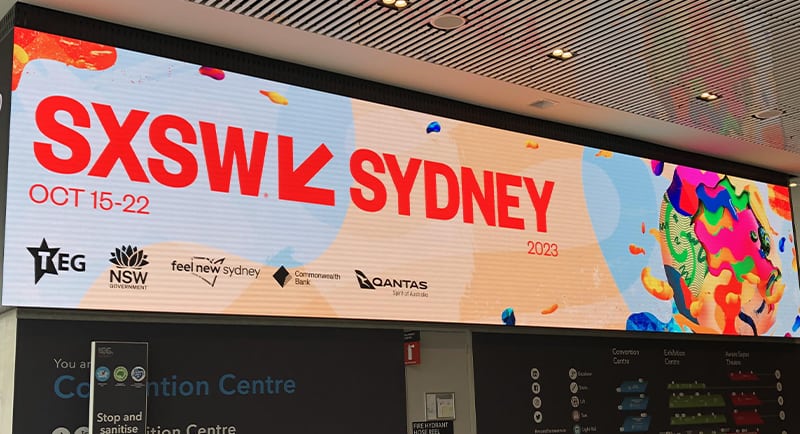Mediaweek is on the ground at SXSW Sydney, with coverage brought to readers, listeners and viewers by Ryvalmedia and News Shorts.
Here’s what happened on Tuesday, October 17.
Launching WPP’s Creative Capital Index With Rose Herceg
By Alisha Buaya
WPP House opened its doors to attendees for the launch of the WPP Creative Capital Index – a creative index designed by WPP’s BAV, its global strategic consultancy with expertise in consumer insights, brand, and marketing strategy.
The WPP Creative Capital Index combines influence with creativity to show how brands with creative capital out-perform markets consistently and significantly.
Rose Herceg, WPP president for Australia and New Zealand, took to the stage to introduce and discuss how the Index can help brands quantify the return on investment in creativity and tap into its power.
Herceg was joined on stage by Katie Rigg-Smith, chief strategy officer of WPP Australia and New Zealand, and Suncorp’s head of mass brands and content, Rapthi Thanapalasingam.
Herceg asked why it was very rare for CFOs of companies to highlight marketing as a lever of economic success for an organisation. To which Rigg-Smith answered that it was because they lacked the language to help translate that to the board room.
“It needs to be in metrics that they care about, business metrics, sales organisations, as opposed to vanity metrics, that they don’t see the tangible thing.
“I believe there are CFOs that want to lean into it; they just want to understand how they can translate that. So, hopefully, things like the Creative Capital Index help us translate it into how it’s performing on the stock exchange.
Love It Or Hate It: Advertising’s Power To Shape The Future
By Alisha Buaya
GroupM welcomed attendees to it’s session: Love it or hate it: Advertising’s Power to share the future.
The session was presented by the Today Show’s Brooke Booney, who was in discussion with GroupM’s Global CEO Christian Juhl.
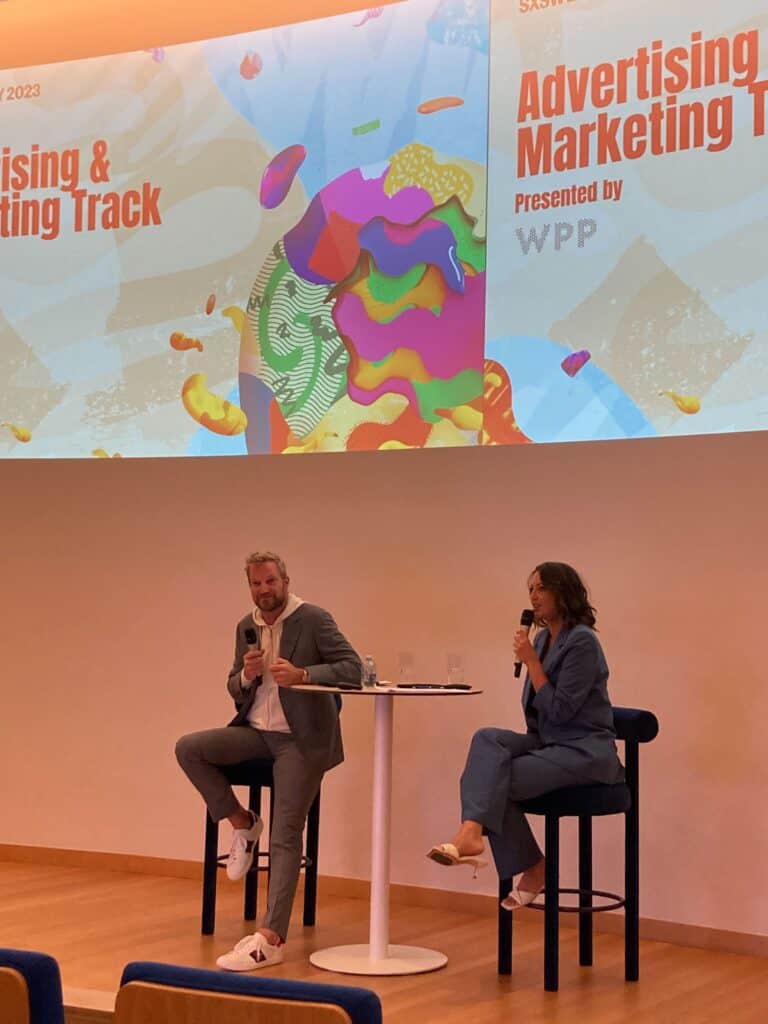
The duo discussed the evolution of the advertising industry and how leaders in the industry are managing their complex responsibilities to individuals, societies, and clients. They also looked at the future of advertising, the talent coming through and the lessons from the past decade that can be taken into the next to shape the future.
Juhl shared that one of the reasons he took on the role of Global CEO of GroupM was because of his belief that advertising plays an important role to play in the world.
Elsewhere, Juhl reflected on the importance of humour in advertising, particularly in a world with much sadness and devastation. He recalled a recent meeting with the WPP global chief creative officer, Rob Riley, and a comedian where they discussed the loss of humour in advertising.
“I think there’s an opportunity to bring funny back to a greater degree than we have and to make advertising pleasurable,” he said.
“I think advertising needs to reflect the moments of culture. But it also needs to provide a sense of relief, in some ways that sense of humour, or entertainment or something that allows you to lift yourself up. In most cases, you’re watching television for entertainment, I think a little bit of a jolt in the arm wouldn’t be too bad for them,” Juhl added.
How the Korean Content Industry Conquered the World
By Jasper Baumann
The first panel of the day explored the Korean film and television industry and how the content being produced out of the country has attracted so much attention on the global stage.
The session featured TV and Film executive Marianne Lee, Film Critic & Commentator Sung-Eun Youn and Director Yunsung Kang who all shared their insight into what magic ingredients go into making South Korean content so popular.
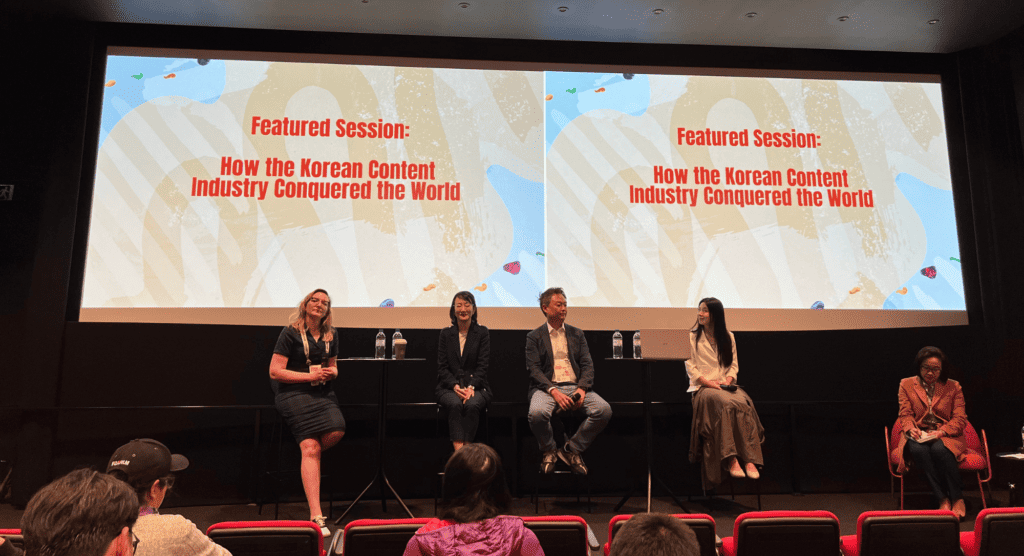
Lee said: “A lot of K-Dramas know their audience, and it’s mostly always female-skewed. The trailer will always feature a 6ft guy with a six-pack and it’s really on purpose because producers know their audience, and it’s proven to work wonders.”
Not all South Korean content coming out is female-skewed skewed, however, as Director Kang revealed that Netflix’s hugely popular Squid Game, blew up overseas before it did in Korea.
“Squid Game has a basic story that can be understood in a wide appeal. While it has themes of family, slight comedy and social commentary, those themes aren’t just exclusive to Korean culture. Yes, they are prominent and potent, but anyone in any country can watch this show for example and connect with it, even in a completely different language,” he said.
Cindy Gallop – How To Reinvent Aspirational Culture And Make A Huge Amount Of Money
By Alisha Buaya
Advertising industry icon Cindy Gallop, presented by Equity Hive, treated audiences to a thought-provoking and insightful discussion.
Her wide-ranging talk saw her cover gender politics in advertising, age and misogyny in the industry, the contrast between sex through the female gaze, the culture surrounding sex, sexual education and pornography (as well as her company MakeLoveNotPorn).
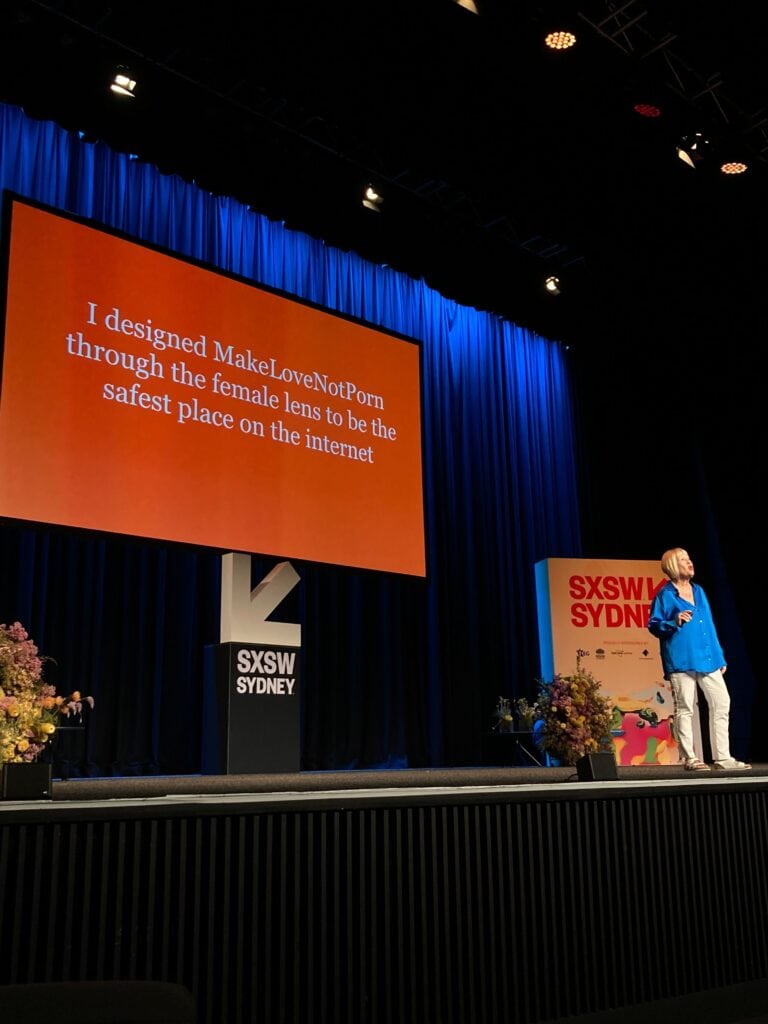
“The way you think about us is, if porn is the Hollywood blockbuster movie, MakeLoveNotPorn is the badly needed documentary,” she quipped.
Gallop shared that she is currently seeking funding to scale up MakeLoveNotPorn and to build product expansions, which includes AdTech for companies that see personal and sexual health and well-being products and an all-ages sex education platform.
Gallop, whose tagline is, ‘I like to blow shit up. I am the Michael Bay of business,” gets the guests all the time.
Turning back to the advertising industry, Gallop said that “women challenge the status quo because.”
“There is a huge opportunity to reinvent our industry for the better through the female lens,” she said.
This keynote will be as lively as you’d expect of someone whose tagline is, ‘I like to blow shit up. I am the Michael Bay of business.’
Paul and Andrew Bassat in Conversation
By Jasper Baumann
Paul Bassat and Andrew Bassat next reflected on their journey in co-founding SEEK, a market leader in online employment marketplaces across Asia Pacific and Latin America.
The Bassats shared their personal experiences in founding and growing a business together as professional partners and brothers revealing that with most things in life, it wasn’t a simple road, with events such as the GFC and COVID really scaring them both.
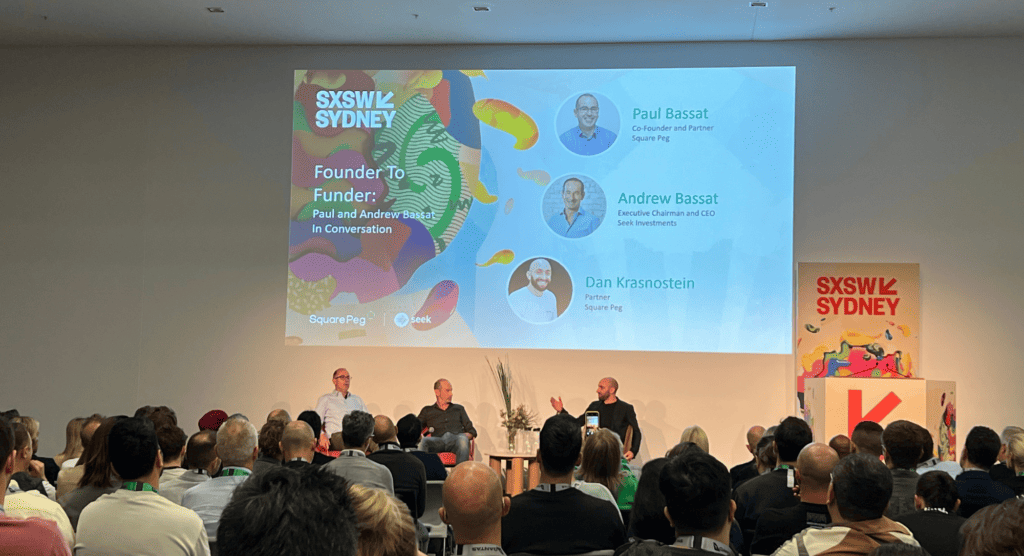
They also revealed their tips for companies early in the journey, saying they need to have a pre-product market fit and a post-product market fit.
“Ultimately, you can’t try to scale a business that hasn’t achieved product market fit. We were lucky at SEEK, I think we achieved that product market fit relatively early in our journey, but it’s sort of the hardest thing to achieve,” Paul said.
“If there aren’t a bunch of people out there, telling their friends, telling their family, telling their colleagues about your product, then you probably haven’t got product market fit.”
How To Develop A Metaverse Playbook
By Tess Connery
Sean Seah leads Microsoft’s global metaverse accelerator and helps Fortune 500 companies move to the metaverse across the world.
Speaking about the public’s interest in the Metaverse, Seah told the room about Hype Cycles, and pointed out that the Metaverse is currently in the “trough of disillusionment” but will be on the rise at the next stage of the cycle.
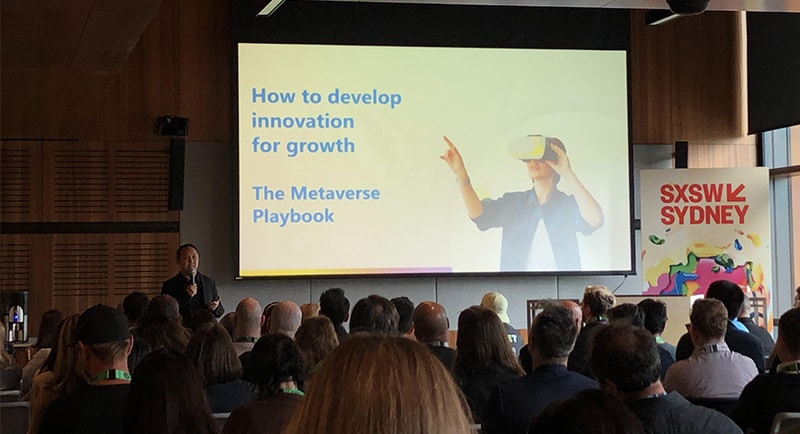
Speaking about the practical uses for the Metaverse, Seah said that “I also worked with an airline. The problem statement that came to me was, we have an amazing 150 million US dollar training thing – it looks like the A380, all that stuff. Now, with post-COVID travel coming back, we’re getting smashed trying to recruit all these different people. So how do I enable my staff to learn without building another $150 million physical facility?
“We came up with the option of actually creating a training centre in the Metaverse.”
Despatches From… An Insider’s View Into International Reporting
By Alisha Buaya
The BBC presented a session featuring ABC, SBC and BBC news executives as they discussed the realities of international reporting, particularly when reporting on the war.
BBC reporter Lucy Hockings presented the panel with Mandi Wicks, director of news and current affairs at SBS, Justin Stevens, Director of News at ABC, and Jonathan Munro, deputy CEO of BBC news and director of Journalism
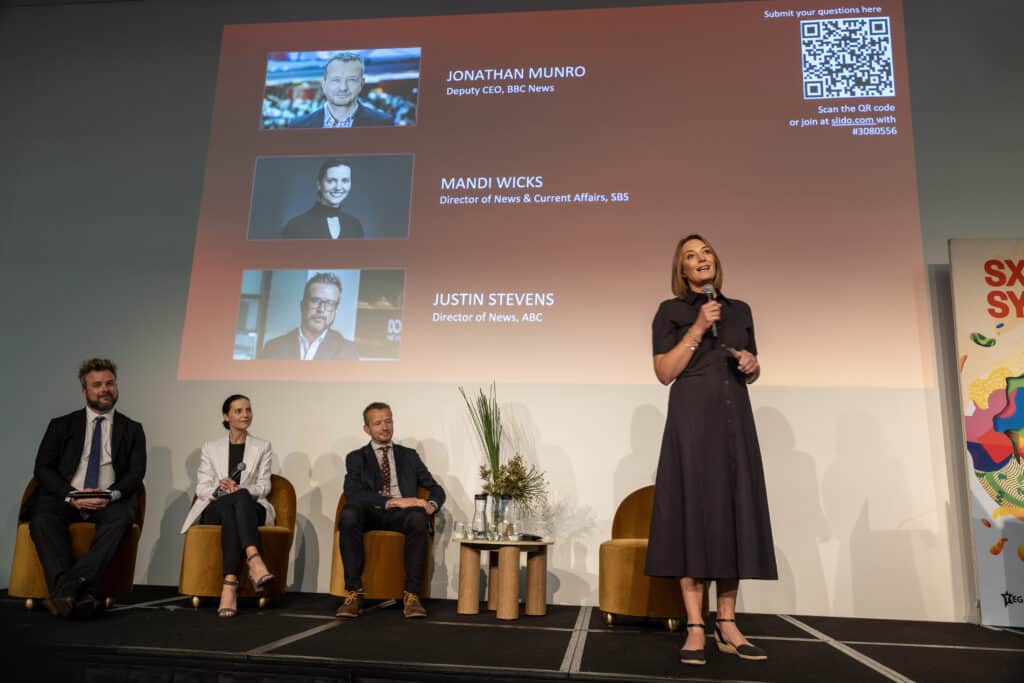
The topic also saw video call reports from BBC’s Middle East correspondent Tom Bateman on covering the Israel-Gaza conflict. James Waterhouse, the BBC’s reporter based in Kyiv covering the Ukraine-Russia war. They each discussed their own experiences dealing with safety and risks, as well as reporting on the truth.
Hockings also asked why the ABC and BBC have steered away from describing Hamas as a terrorist organisation. Stevens said: “In situations like this, we have ongoing editorial discussions about being very intentional about the language we use… We have a nuanced approach at the moment where like the BBC, we don’t see it as our role to describe different groups as a terrorist organisation. That’s the role of governments.
“We know and extensively in our reporting that the Australian government and a few others have already designated in recent years that Hamas is a terrorist organisation, and we make that clear. But we are quite particular and issue guidance notes to that effect so that we have consistency in how we’re doing it.”
Munro said: “This is not a decision about Hamas. This is a decision about any group anywhere in the world that is described by others as terrorist… Once you start down the road of ascribing the terrorist word the T word to certain groups and not others you are seen as making a valued judgments about the organisation or their motives.
“But we are not prepared to use the word because when it comes to the momentum in this particular conflict changing, which is inevitable over time, we will get into further intense pressure to start describing other acts as acts of terror.”
Tom Nash – Designing for One, Designs for All
By Jasper Baumann
Tom Nash opened his talk with a simple quote: “Our needs will be the real creator.”
The quote from Plato sums up in a nutshell what Nash’s message is, informing people how disability can help to inform unique design.
Having contracted meningococcal disease at age 19 and losing his arms and legs, Nash informed the audience how Universal Design solves problems for the individual while having unintended positive consequences for the wider population.
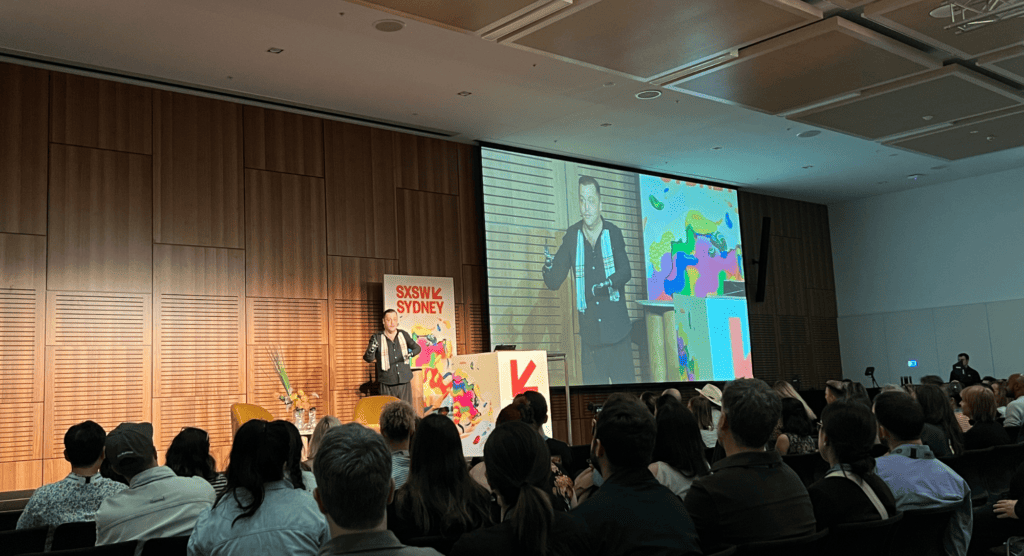
It’s a fascinating design process, the idea that designing for one can be designed for all is something that is truly perspective-changing. Nash uses an example of the Curb Cut effect.
“The Curb Cut effect uncovers a need in people that wasn’t initially intended. For example, your phone’s vibration feature was intended for deaf people, the same way closed captions were also made for deaf people. Nowadays, it’s commonplace, everyone in this room has their phone on vibrate right now and the use of subtitles is on the rise,” he said.
Menopause And Midlife: A Springboard For Reinvention
By Tess Connery
One of the most anticipated sessions of the day was Menopause And Midlife: A Springboard For Reinvention. Held in the Great Hall at UTS, Mia Freedman led a panel made up of Naomi Watts, Dr Ginni Mansberg, and Alison Brahe Daddo to speak about menopause and the impact it has on women’s lives.
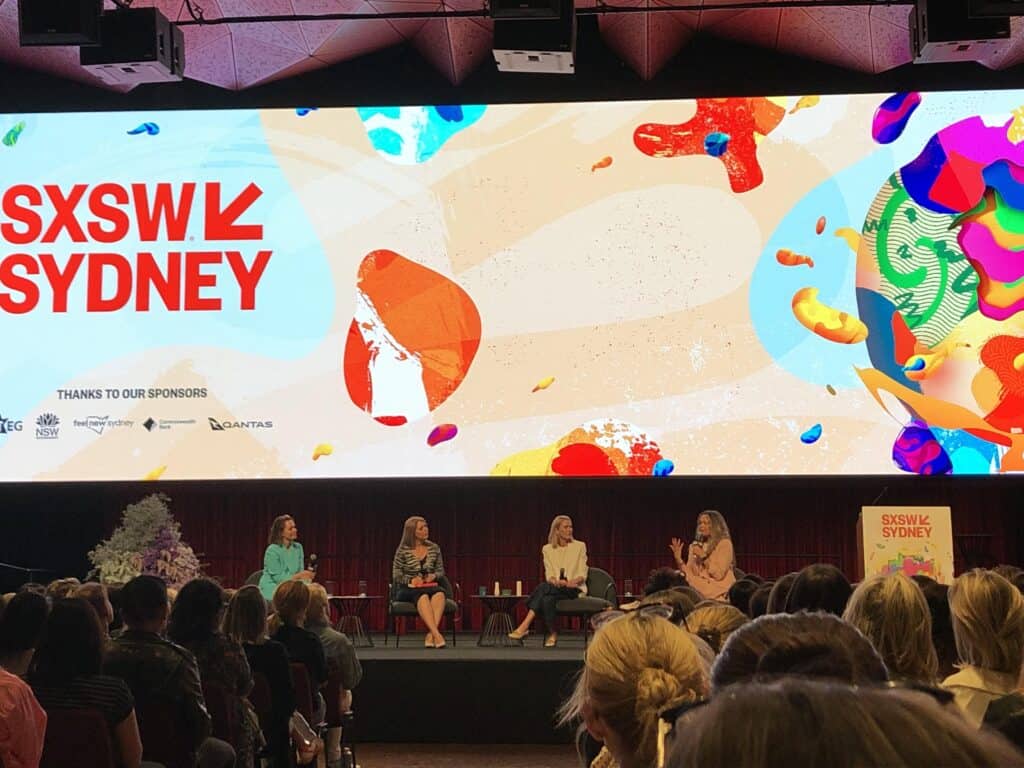
Reflecting on her first brush with menopause, Watts told the room that I knew nothing.”
“I did know that my mother went into menopause early, but no other information surrounding that, “ said Watts.
“I happened to go to my doctor and say, look, I’m not getting pregnant. I’ve spent my whole life trying not to get pregnant, and now suddenly I want to get pregnant, and it’s not happening. So the doctor suggested that we take a blood panel – I took the bloods, and the bloods suggested that I was close to menopause. That’s where the panic came in. I was 36.”
“That was the first uttering of that comment being introduced to me. I went to my mother and said, what the actual? Why didn’t you tell me more? And she said, well, these were the conversations I never had with my mother because she never had them with hers. And so the cycle went on.”
From Tradition To Transformation
By Tess Connery
With the Paris 2024 Games less than 300 days away, QMS provided a panel that discussed the transformational narratives surrounding athletes, and the role played by out of home in those stories.
With Olympian and Paris 2024 Chef de Mission, Anna Meares facilitating, the panel was made up of Australian Olympic Committee CEO, Matt Carroll AM, Para-athletics Paralympian, Vanessa Low, and QMS CEO, John O’Neill.
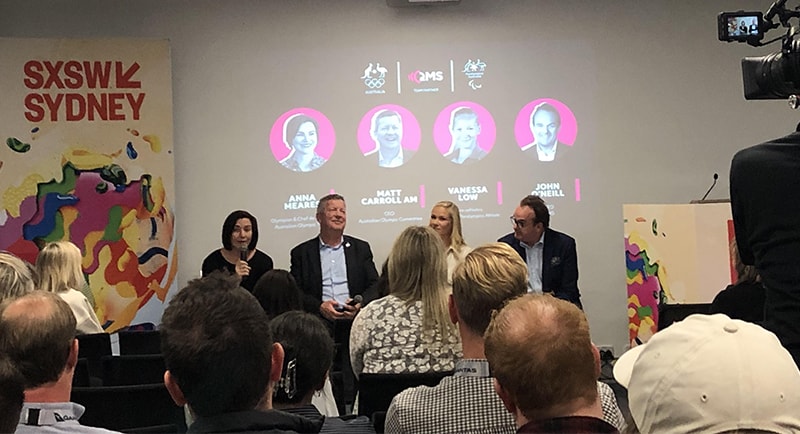
Speaking about the evolution of out of home, and how it will help boost the storeis of athletes across both the Olympics and Paralympics, O’Neill said that “traditionally out of home was prints and posters, put them up and pull them down. If the wind and the rain were coming, your stuff didn’t go up on time.
“We’re now clearly in a position where we have a wonderful digitally connected network, and we understand the audience better than we ever did before – we have more information, we have more data.
“It’s a really exciting time and a big responsibility. We want to keep things up to date – you’ll be driving into work, you’ll be walking around the city, there’ll be updated stories. We’re hoping that with social media, we’re talking about sending messages back from the athletes, and communicating these messages around on street furniture and large format digital. We really want to get everybody involved and immersed in the two week period.”
Shaping the Next era of Media with GroupM
By Alisha Buaya
EssenceMediacom’s Dan Collier Hill kicked of GroupM’s afternoon with a keynote speech on how Gen Z (ages 10 to 24) is the cultural power and impact of sport. “Gen Z are beginning to rewrite the rule book in how we think about sports fandom,” he said.
“They are a generation that have grown up expecting instant gratification, communication, and access. Before they could wipe, they could swipe,” he joked. “90% of them prefer authenticity over curation – meaning this idea of picture perfect is beginning to fade for them.
“The prefer to follow athletes over teams partly because they’ve got direct access to social media but also because of a growing sense of connection through shared values.”
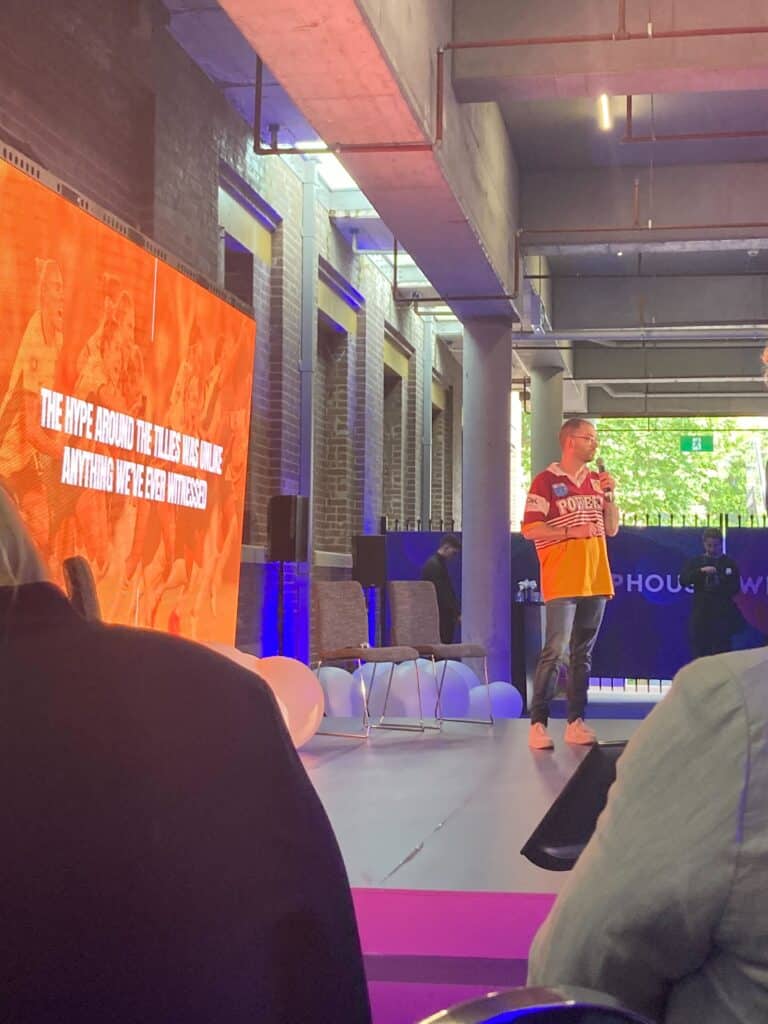
After a snack break/networking opportunity, the attendees were then moved into the Powerhouse Museum for Mindshare’s panel on how First Nations languages can be incorporated by advertisers and marketers in their workplaces and in their work.
Natalie Ahmat, head of Indigenous News and Current Affairs, and presenter on NITV News and NITV News: Nula, led the discussion alongside Indigenous Literacy Foundation CEO Ben Bowen, IFC programs manager Tictac Moore and Filipino-Aboriginal artist DOBBY.
The trio encouraged the respected use of First Nations language, DOBBY reiterated this point saying: “When you’re looking at what this country means internationally, don’t keep us a secret. Put our language forward because that’s something we should all be proud of. If you can help us bridge that gap and have those connections, it helps all of us – not just Indigenous people.”
This was followed by a fireside chat with The Chase host Larry Emdur and singer Guy Sebastian as they discussed his story telling process as a singer and songwriter.
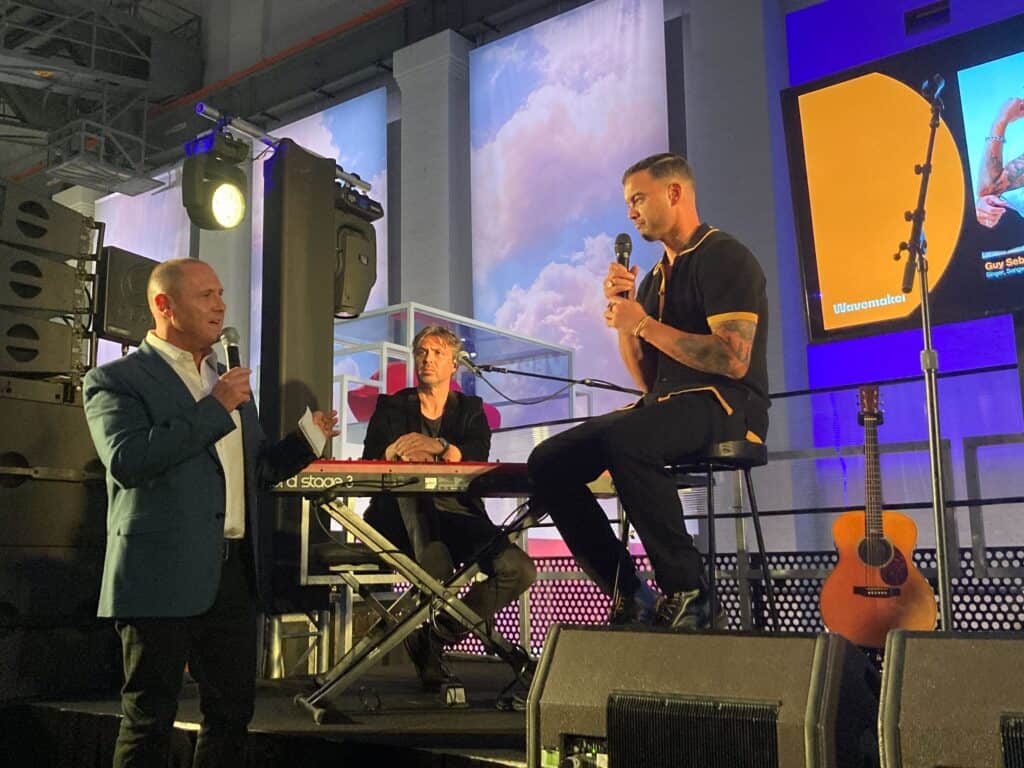
Sebastian shared his taken-on creativity, coming up with ideas and how marketers can adopt some of his methods.
“I can only speak from obviously my experience and what I’ve had to learn and 20 years. I would say a story always starts with a message and it’s the core message of that story – what all we want people to receive from this, what do I want them to feel and how am I going to paint that landscape around the message that I want them to feel.
“I think what I learned through the process is sometimes the simplest and smallest way of telling that story is the most effective way because you’re trying to say the world in this song, I want to say, ‘Hey, I’ve got your back, I’ll protect you, whatever the weather I’m, I’m your knight in shining armour.’ But sometimes all you have to say is, “now that it’s raining more than ever, you can stand under my umbrella.” Sometimes you can do something that’s so simple, that ca be so representative of this greater picture that you want to say and it’s about courage.
“Once you know that message, and you’ve got conviction in that message, don’t be so driven all the time by what other people deem is successful, you know what you need to say, and sometimes it takes chapters to save the story and not all of them have to be the favourite chapter, but they’re important in all the pieces,” Sebastian concluded.

